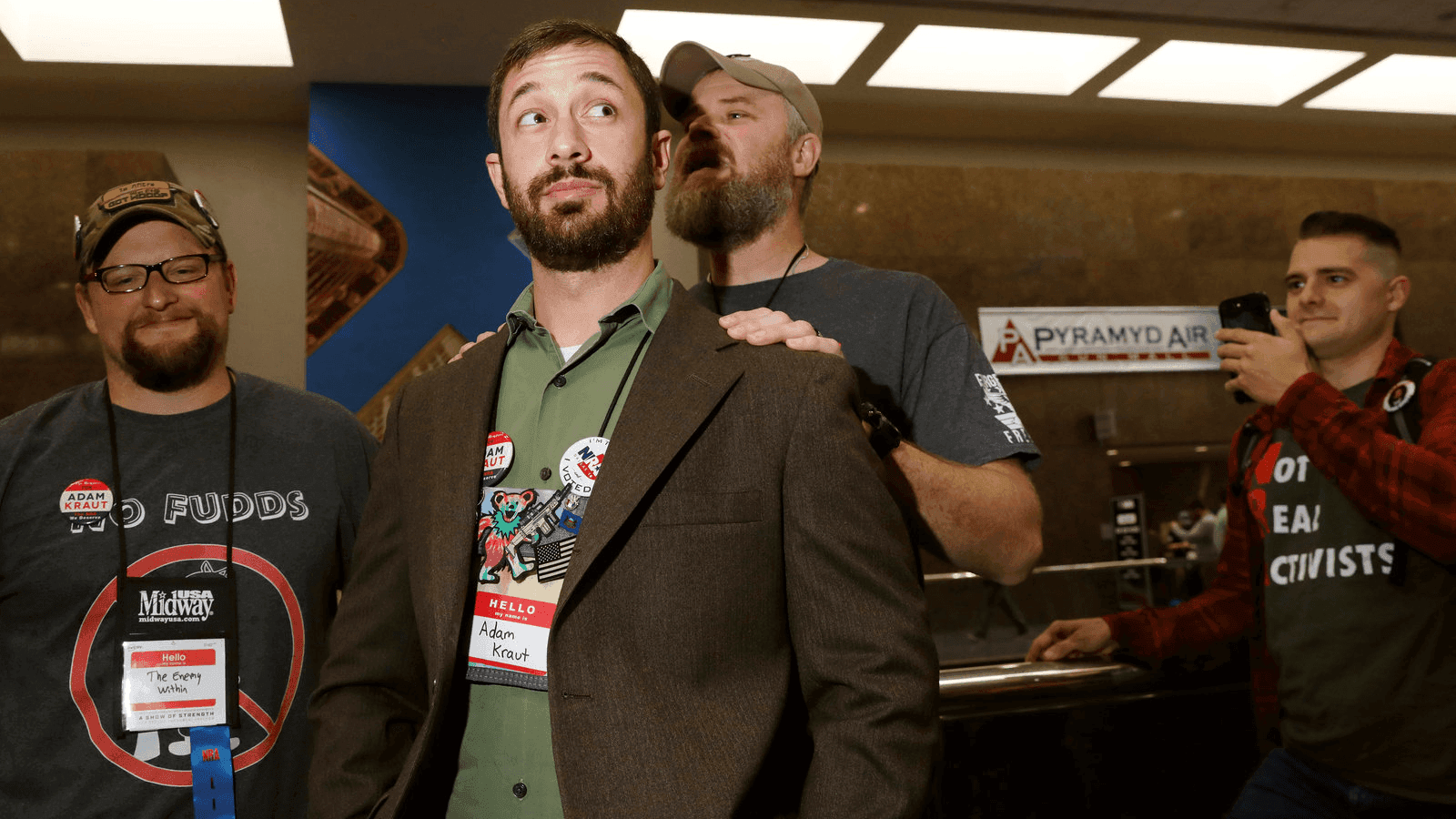Gun rights proponent Adam Kraut, speaks to NRA members about his candidacy for a seat on the board of the National Rifle Association (NRA) at the organisation’s convention in Dallas, Texas, May 5, 2018.
About 100 protesters, many wearing T-shirts emblazoned with “NRA = Not Real Activists,” marched through the National Rifle Association’s annual meeting in Dallas in May to slam the powerful gun lobby as too conciliatory on gun rights and rally for their candidate for the board.
Adam Kraut, a gun rights lawyer, fell about 4,000 votes short of the 71,000 needed for election, but earned 5,000 more than the previous year, a sign of the growth of the Second Amendment purists within the NRA known to many as “gundamentalists.”
With opinion polls showing US public support for more gun control growing in the wake of mass shootings in recent years, the NRA is facing internal pressure from this little-known force that is demanding that the leadership concede zero ground to gun control advocates.
Its rise has rattled the NRA leadership and threatens the association’s ability to hold on to moderate supporters and to make compromises that might help fend off tougher gun control measures, according to some of the two dozen gun rights activists, policy experts and gun control advocates interviewed for this story.
“Generally, they have a disproportionately huge amount of power in the gun rights movement,” said Richard Feldman, a former NRA lobbyist.
The NRA has faced divisions before. An internal revolt at the 1977 meeting in Cincinnati turned the polite, sport-shooting organization into a bare-knuckled political lobby that today claims five million members and is closely aligned with the Republican Party, funding pro-gun politicians. The NRA, which spent $30 million to support Donald Trump’s 2016 presidential campaign, is often viewed by gun control advocates as implacably opposed to tighter gun laws.
The NRA leadership has put up obstacles to Kraut’s election, both with bylaws that make it harder for candidates not put forward by the nominating committee to get elected to the board, and by enlisting a senior member to campaign against him.
Marion Hammer, a past president of the NRA and one of the group’s most successful lobbyists, denounced unsanctioned candidates in a column on the website Ammoland just as Kraut appeared on the 2018 ballot. Though Hammer did not name Kraut, he was one of only two non-approved candidates to run.
“Once again the NRA is being threatened by the enemy within,” Hammer wrote. “It is time to wake up and stop it before it begins.”
Neither the NRA nor Hammer responded to requests to address the influence of the gundamentalists and the criticism that these activists and other gun rights groups directed at the lobby.
Social media pressure
The Dallas protesters, almost all white men, included bearded outdoorsmen and buttoned-down libertarians. Some said they hid their T-shirts while entering the conventional hall for fear that NRA security would ban them.
Kraut, 31, who says he grew up in a house without guns but as an adult taught his father how to shoot, practices firearms law in suburban Philadelphia and also hosts a video blog called The Legal Brief on The Gun Collective, a YouTube channel.
He has campaigned for the NRA to push for even more expansive gun rights laws. He wants to change NRA bylaws, such as imposing term limits for board members and mandatory meeting attendance, to renew its leadership.
“Some members feel it (the NRA) doesn’t go far enough to defend what we believe to be the core of the Second Amendment,” Kraut told Reuters.
One of Kraut’s most prominent supporters, Tim Harmsen, who led the pro-Kraut march through the convention center, has 770,000 subscribers to the Military Arms Channel on YouTube, where he criticizes the NRA for being weak on gun laws.
“We’re going to continue to apply pressure (on the NRA) every way that we can through social media and we’ll be there again next year,” Harmsen said.
These hardliners deeply cherish their right under the US Constitution’s Second Amendment to keep and bear arms. They oppose any form of gun control, saying criminals will find ways around gun laws, which only strip lawful gun owners of the right to self-defense and protection against state tyranny.
The gun rights purists are outraged by any concessions the NRA makes in the wake of mass shootings, even if they are made to avoid stricter gun control laws. Opinion polls such as a regular Gallup survey show growing support for gun control in recent years. Within that trend, support for gun control typically spikes immediately after mass shootings, then falls closer to pre-massacre levels within a few months.
After a shooter killed 58 people at a country music concert in Las Vegas last year, the NRA supported federal regulation of bump stocks, accessories that the gunman used to fire his semiautomatic rifles more quickly. The Justice Department then ordered an effective ban that is close to being finalized.
Amid nationwide protests that followed a Florida high school shooting that killed 17 people in February, the NRA endorsed strengthening background checks for gun purchasers and emergency protection orders that allow law-enforcement officials to temporarily take guns away from people deemed dangerous.
“For us, some of the things that come out of NRA headquarters are just outrageous and abhorrent,” said Jeff Knox, a Kraut supporter whose father, Neal Knox, led the “Revolt at Cincinnati” in 1977. “It’s: Holy cow, what are these guys thinking?”
Daniel Trotta of Reuters reported this story.
